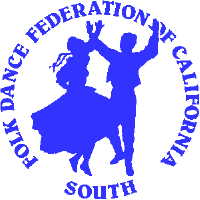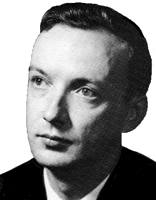
|
Folk Dance Federation of California, South, Inc.
|

|
CLICK IMAGE TO ENLARGE
"Ero" is a colloquial word, an ethnic "nickname" referring to a person from Hercegovina, and in Western Serbia it was used specifically in reference to the large number of immigrants to the area who came from Hercegovina during Ottoman rule, forming a distinctive ethnic group there.
(Digression: The word "Ero" is perhaps best known from the title of a very popular Croatian comic operetta "Ero s'onoga svijeta" ['Ero from the Other World' or 'Ero the Trickster'] based on a folk tale about a wily Ero who convinces a grieving village widow that he has come from the "Other World" with a list of things her deceased husband needs, collects them [including money, the deceased's finest horse, etc.] from her and rides off. End of digression.)
The adjectival form (neuter) of Ero is "ersko," and is here used with the neuter noun "kolo": "ersko kolo" [literally 'Hercegovinian kolo', but in this case connoting "kolo originating with the ethnic group whose members are called 'ero'"].
Ersko kolo is done to the melody of a folk song entitled "Ja idok" ('I walked'), which often replaces "Ersko kolo" as the name of the dance.
1. /: Ja idok, idok, idok
dok devojku jedva stigok. :/
2. /: Ja brdom, brdom, brdom,
a devojka dolom, dolom. :/
Translation:
1. /: I walked and walked and walked
and just caught up with a girl. :/
2. /: I took the high road, high road, high road,
and she took the low road, low road. :/
During World War II, "Ersko kolo" was picked up by all the embryonic KUDs and became standard repertoire, in a number of variants. I learned it in 1952 from dancer Miodrag Vukovic', Belgrade, and brought it to the United States. The Duquesne University Tamburitzans recorded it (without lyrics) in 1954 on Michael Herman's Folkdancer label, and I introduced it at Stockton in 1955.
"KUD" means Kulturno-umetnička društva (Cultural-Artistic Society), a state-sponsored folk group founded for the preservation of national folk music and dance, as opposed to being for entertainment purposes.